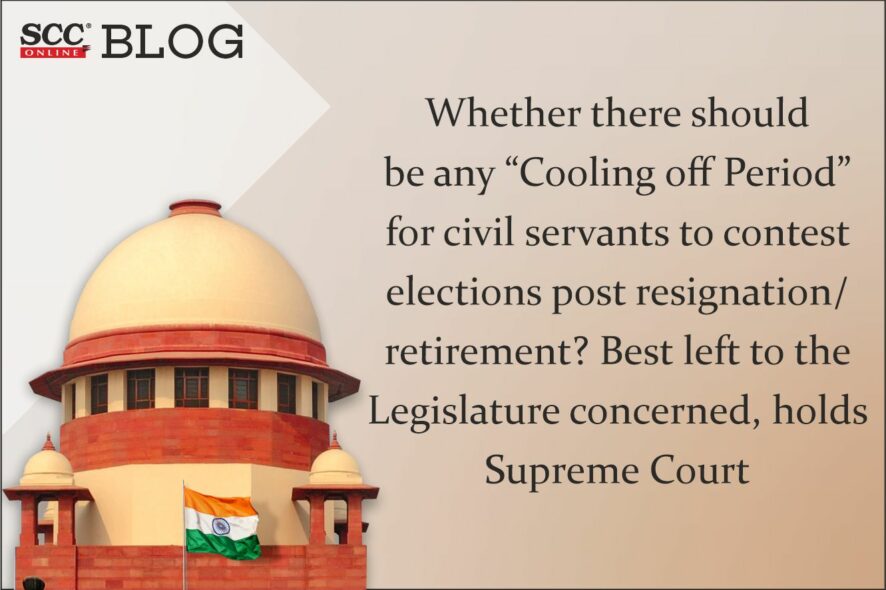Supreme Court: The Division Bench comprising of Indira Banerjee and A.S. Bopanna, JJ., dismissed a PIL seeking issuance of writ of Mandamus on the Union of India, to impose restrictions to prevent Civil Servants from contesting elections to the Legislature, Central or State, on a political party ticket, immediately after retirement or resignation from service, by imposing a “Cooling off Period”.
Finding the allegations of bureaucrats deviating from strict norms of political neutrality with a view to obtaining party tickets to be vague, devoid of particulars and unsupported by any materials, the Bench expressed,
“No particulars have been given of the number and/or percentage of erstwhile bureaucrats, who have contested elections on the ticket of a political party, not to speak of any act on their part, prior to their retirement, in deviation of the standards required of bureaucrats.”
Law on Mandamus
A Mandamus lies for enforcement of a fundamental right or a statutory right, or the enforcement of a fundamental duty related to enforcement of a fundamental right or a statutory right. In exceptional cases, a writ may even lie for enforcement of an equitable right. The breach or threat to breach a fundamental, statutory or may be enforceable equitable right, is the sine qua non for issuance of a writ of Mandamus. The right to compel performance of a public duty must be that of the Petitioner.
Hence, observing that there was no complaint of violation of any fundamental right of the Petitioner or any group of persons represented by the Petitioner, the Bench held that the writ petition could not be entertained; the Bench observed,
“Nobody has the fundamental right to get a mandatory order of this Court directing the appropriate Legislature to enact law or the Executive to frame rules imposing restrictions on the eligibility of civil servant to contest elections.”
The Bench clarified that the writ of Mandamus is only granted to compel performance of a public duty or to enforce private rights when duties of a public nature, affect public rights or when private rights are breached by or in collusion with public officers. The legal duty that may be enjoined by Mandamus can be one imposed by the Constitution, a statute, any law or by rules or orders having the force of law, which are capable of being judicially enforced.
Judicial Limitations on issuing Mandamus
“This Court, and/or the High Court, does not give any direction to the State to enforce an Act passed by the Legislature. Nor does the Court enforce instructions in a Departmental Manual not having statutory force, any non-statutory scheme or concession which does not give rise to any legal right in favour of the Petitioner, far less, any recommendation made by an authority such as the Election Commission.” Observing the aforesaid, the Bench held that it is for the Union of India to take a decision on the recommendation of the Election Commission, in accordance with law and that it is not for the Court to decide what should be the policy of the Government. Since, policy matters are never interfered with, unless patently arbitrary, unreasonable or violative of Article 14 of the 5 Constitution.
Observations and Conclusion
Noticeably, the petitioner had filed a similar petition in the Jharkhand High Court which had been dismissed; however the petitioner did not question the dismissal order in the Supreme Court. Therefore, the Bench held that the petition was barred by the principles of res judicata and/or principles analogous thereto. With regard to the issue raised, the Bench opined,
“There can be no doubt that law may be enacted, laying down the norms and qualifications for contesting specific elections. It is, however, for the appropriate Legislature to frame the law. There can be no doubt that civil servants should maintain the highest ethical standards of integrity and honesty; political neutrality; fairness and impartiality in the discharge of duties, courtesy, accountability and transparency.”
Integrity, impartiality, neutrality, transparency and honesty being non-negotiable for the civil servants, the Bench held that ethical standards necessarily have to be enforced and stringent action taken against the concerned officer whenever there is any breach of ethical standards as laid down in the All India Services (Conduct) Rules, 1968.
Apart from the fact that no fundamental right of the Petitioner was in issue, the Bench opined that there was no merit in the contentions raised, even otherwise.
Hence, the Bench concluded that it is not for the Court to interfere in matters relating to framing of law, rules or policy and the question, whether there should be any “Cooling off Period” for civil servants for them to contest elections or not should be best left to the concerned Legislature.
Consequently, the petition was dismissed.
[Vivek Krishna v. Union of India, W.P. (C) No. 1034 of 2021, decided on 18-04-2022]
Appearance by:
For the Petitioner: Vivek Krishna (in person)







